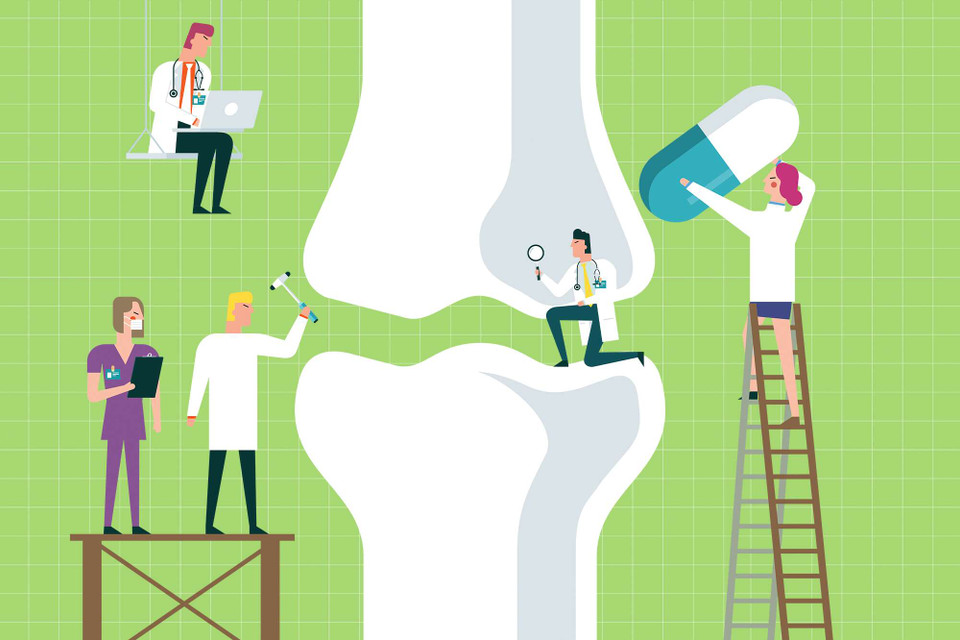Jan 23rd 2024
Calcium and Osteoporosis
The biggest misconception about osteoporosis is that it can be prevented simply by getting enough calcium in the diet or through supplements. At Beyond Health we often get questions about “what’s the best calcium for building good bones?” On the other hand, many people tell us they’ve heard that supplemental calcium can be dangerous (we’ll get to that later).
But first, while we’re glad that more and more women (and men!) of all ages are taking proactive steps to build bones that will last a lifetime, building healthy bone is a little more complicated than just getting enough calcium.
Calcium plays many vital roles in our bodies—in energy production, nerve transmission, muscle contraction, blood clotting and more—but it is certainly most well known as the major component of bone (it makes up about 65% of our bones). But like the star player on a football team, calcium can’t “win the game” by itself. It needs a complete team of vitamins and minerals backing it up.
For example, calcium needs vitamin D for proper absorption. Vitamin D also helps calcium to integrate into bone. Meanwhile, magnesium and boron convert vitamin D into its useful, active form.
Bones are made up of minerals and protein. The minerals calcium, phosphorus and magnesium give bones their hardness—an important quality if you want to stand up straight. However a large part of bone consists of “bone matrix.” This is a lattice-like framework made of protein, mostly collagen, which holds the calcium, phosphorus and magnesium in place, like jewels embedded in a crown. You need vitamin C to create collagen. You need zinc, manganese, silica and copper as co-enzymes to construct bone matrix.
Vitamins C, D and K and the minerals boron, chromium, germanium, selenium and vanadium all play various roles in what’s called bone remodeling: breaking down brittle old bone that has become depleted in its minerals and replacing it with fresh new bone.
Very importantly, calcium needs vitamin K2 to direct it to where it’s needed in your body and keep it out of soft tissues where it can contribute to bone spurs, kidney stones, gallstones, arthritis and heart disease. (Vitamin K2 activates a special protein in bone called osteocalcin that draws calcium into storage in the bones, and another protein, MGP, that keeps calcium out of soft tissues.)
Can you see why there’ve been alarming reports linking calcium supplementation with heart attacks? Calcium supplementation can in fact be dangerous without enough vitamin K2 to prevent it from taking up residence in the heart. Also, calcium has a stimulating effect on muscles, including the heart, making them contract. It needs to be balanced by magnesium’s relaxing effect. Magnesium deficiency is much more common than calcium deficiency and is a major factor in many heart attacks.
If you think this is getting complicated, it’s really only a small part of the many interactions and interdependencies involved among different nutrients needed for healthy bones. Nineteen different bone supporting nutrients in all must be present in sufficient quantities for healthy bone to be built. If any one of them is missing-in-action the job cannot be done properly!
That’s why all nineteen are included in Beyond Health’s Bone Mineral Formula, in the right balance and in the best possible, purest and most bioavailable forms.
A huge problem with most calcium supplements is that they’re contaminated with heavy metals: lead, mercury, arsenic, cadmium and nickel. All of Beyond Health’s minerals are from high-purity, toxin-free sources; are recrystallized for added insurance; and are then independently tested to confirm the presence of the desired mineral and absence of contaminants.
Our transport and energy enhancement system has been shown in peer-reviewed studies to achieve 100% uptake by the body, compared to an industry average of less than 20%. And all our minerals are in an organic form—identical to the molecules found in food, so the body doesn’t have to work to dissolve or activate them (as it would with inorganic forms).
Our Bone Mineral Formula was designed to complement our Multivitamin. We also suggest individualized approaches to taking additional vitamin C, vitamin D and magnesium.
You’ll have to get your doctor to check your vitamin D levels, which should be in the range of 50-80 ng/ml. If you’re low, take 1 capsule daily of our Vitamin D Formula, and go back for a retest in 3 months. Some people, especially if you’re older, will need to take 2 capsules a day to get up into the desired range.
So by all means take calcium for your bones—but together with its full team of nutrients, from trusted companies, in pure and desirable forms. And combine these with the bone-supporting lifestyle we’ll be describing next time, when we’ll also talk about magnesium and how to assess your precise need.
References:
 Fuel your life with the purest vitamins
Fuel your life with the purest vitamins
